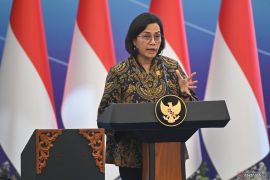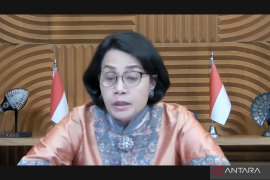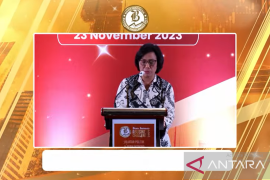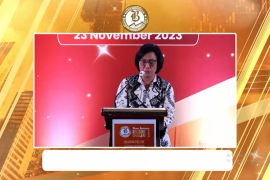"Indonesia's financial system stability is in a normal condition amid increasing external pressure due to the war in Ukraine," Chair of the Financial System Stability Committee (KSSK) Sri Mulyani noted at a press conference in Jakarta, Wednesday.
Indonesia's financial system stability staying normal is apparent from the sustained economic recovery, especially supported by the better handling of COVID-19, the minister of finance remarked.
The decline in the number of cases and effective handling of COVID-19 was followed by the easing of restrictions on community activities, which in turn stimulated domestic economic activities.
Indonesia's economic growth is also forecast to remain strong, supported by public or household consumption and investment activities as well as support for government spending.
Indicators of financial system stability were also reflected in export performance, which experienced a significant increase.
Sri Mulyani suggested to continue to watch out for an increase in exports in line with global trade developments and global economic growth that were threatened by the war in Ukraine.
Several economic indicators until early March 2022 were also recorded well, such as the consumer confidence index, retail sales, growth in motor vehicle sales, cement consumption, and electricity consumption.
Meanwhile, from the external side, the trade balance surplus in February 2022 increased to US$3.83 billion, supported by the non-oil and gas trade balance surplus, especially with rising global commodity prices of coal, iron, steel and CPO, among others.
On the other hand, with increasing uncertainty in global financial markets and the inflow of foreign capital into domestic financial markets, which are under pressure, portfolio investment experienced a net outflow of US$1.3 billion as of March 31, 2022.
However, this pressure of net outflow as compared to other emerging markets, which also experienced net outflows, was still relatively lower or better.
Related news: WB lowers Indonesia's growth projection to 5.1 percent for 2022
Indonesia's foreign exchange reserves in March 2022 are still at a high level, reaching US$139.1 billion, which is equivalent to financing 7.2 months of imports or seven months of imports and financing the government's foreign debt.
This standard is above the international adequacy standard that is usually calculated at about three months of import needs.
"Hence, it is more than double the international adequacy standard," Sri Mulyani pointed out.
Furthermore, the rupiah exchange rate was maintained amid increasing global financial market uncertainty, although in the first quarter of 2022, the rupiah exchange rate experienced a slight depreciation of 0.33 percent on average as compared to the position at the end of 2021.
The rupiah depreciation was lower than the currencies of several other developing countries, such as the Malaysian ringgit, 1.15 percent (ytd); the Indian rupee, 1.73 percent (ytd); and the Thai baht, 3.15 percent (ytd).
Finally, Indonesia's inflation until March 2022 also remained under control at the level of 2.64 percent (yoy), supported by the still fairly controlled supply side in response to the rising demand.
"Also controlled inflation expectations, stability of the rupiah exchange rate, as well as various government policy responses, especially in maintaining goods regulated by the government," she explained.
Related news: First-quarter economic growth realization to be better: Ministry
Related news: Global economic imbalance to continue in 2022: BI
Translator: Astrid F, Azis Kurmala
Editor: Suharto
Copyright © ANTARA 2022












